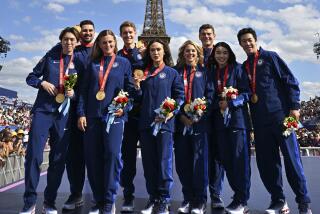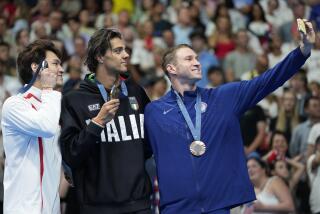U.S. figure-skating lineage is rich in Olympic glory
- Share via
Over the years, no country has won more figure-skating medals or been more passionate about the sport than the United States.
Nearly all the attention went to women’s singles, because U.S. women have won seven Olympic titles, and some morphed from ice princesses into entertainment icons.
Those U.S. women are all effectively the skating heirs of a Norwegian.
After the better part of a century, the lineage is breaking.
Along the way, though, their “family” history became the chronicle of a sport.
WOMEN
2010 Vancouver: None
2006 Turin: Sasha Cohen, silver
Michelle Kwan withdraws after one practice in Turin. It is her unofficial retirement from competition, leaving the sport without a female star in the United States for the first time in 50 years and accelerating a decline in interest that continues when U.S. women do not win an Olympic or world medal in the next seven seasons.
2002 Salt Lake City: Sarah Hughes, gold; Kwan, bronze
Hughes, 16, fourth after the short program, pulls off the greatest surprise in Olympic women’s skating to win the gold. Short program winner Kwan stumbles to bronze, making her the greatest skater never to win the Olympics.
1998 Nagano: Tara Lipinski, gold; Kwan, silver
Lipinski, 15, becomes the youngest champion by upsetting heavily favored Kwan, 17, whose graceful acceptance of defeat becomes an element in her wide popularity and admiration. Never do the gold and silver medalists skate as brilliantly in the Olympics as Lipinski and Kwan.
1994 Lillehammer: Nancy Kerrigan, silver
As if Kerrigan’s incident with Tonya Harding isn’t enough to stir the pot, the women’s event finishes in a controversial victory by 16-year-old Ukrainian orphan Oksana Baiul over Kerrigan. Baiul, then the second youngest champion in history (after Sonja Henie), moves to the United States and spends a few years a wealthy wild child, with drinking issues that get widely publicized as skating is constantly in the spotlight.
1992 Albertville: Kristi Yamaguchi, gold; Kerrigan, bronze
Yamaguchi becomes first U.S. women’s gold medalist since Hamill but decides not to take advantage of the one-time change in the Winter Olympics schedule and try for another two years later in Norway.
1988 Calgary: Debi Thomas, bronze
Thomas and Katarina Witt, both world champions skating to music from Bizet’s “Carmen,” draw a 40-plus rating for the end of a free skate after which East Germany’s Witt wins gold, Thomas bronze. The sultry, curvaceous Witt lures a sports bar TV crowd while becoming the only woman other than Henie to win more than one gold medal.
1984 Sarajevo: Rosalynn Sumners, silver
1980 Lake Placid: Linda Fratianne, silver
1976 Innsbruck: Hamill, gold
Champion Hamill’s wedge hairdo quickly becomes the most copied hairstyle in the United States. In 1993, Hamill ties with 1984 gymnastics champion Mary Lou Retton for first place in an Associated Press poll of the most popular athletes in the United States. Michael Jordan is third.
1972 Sapporo: Janet Lynn, bronze
Lynn, daughter of an Evergreen Park pharmacist, becomes one of the most beloved skaters in history after winning a bronze medal because of her grace on the ice and the lighthearted way she a handles mistake in the free skate. Hers was a joy of skating so unfettered by judges’ marks that Lynn is able to smile after falling on a flying sit spin. As an ice show star, she was once the world’s highest paid female athlete. In her book “The Passion to Skate,” choreographer and NBC commentator Sandra Bezic wrote, “If an angel could skate, she would move like Janet.”
1968 Grenoble: Peggy Fleming, gold
Fleming’s chartreuse dress is a highlight of the first Olympics broadcast in color. She is the only U.S. gold medalist at the Grenoble Olympics and immediately becomes a celebrity. President Lyndon Johnson receives her at the White House twice. She is the first skater since Henie to have a huge commercial appeal, headlining ice shows and doing TV commentary.
1964 Innsbruck: None
After the 1961 plane crash that kills the elite of U.S. skating, this is the only Olympics from 1952 through 2006 when U.S. women do not win a medal. But a 15-year-old Fleming finishes sixth, setting the stage for her triumph four years later.
1960 Squaw Valley: Carol Heiss, gold; Barbara Roles, bronze
Heiss does a film, “Snow White and the Three Stooges,” after winning gold. Marries 1956 men’s champion Hayes Jenkins and stays in the sport for years as a coach.
1956 Cortina: Tenley Albright, gold; Heiss, silver
Albright becomes first U.S. woman to win gold. She goes on to a career as a Harvard-educated doctor.
1952 Oslo: Albright, silver
1948 St. Moritz: None
1944 No Games
1940 No Games
1936 Garmisch: None
After winning her record third Olympics gold medal, Norway’s Sonja Henie moves to California and stars in films and ice shows that inspire future Olympic champions from the United States, beginning with Albright in 1956. Of Henie, 1960 Olympic champion Heiss says, “She made skating, especially women’s skating.”
1932 Lake Placid: Maribel Vinson, bronze
1928 St. Moritz: Beatrix Loughran, bronze
1924 Chamonix: Loughran, silver
1920 Antwerp: Theresa Weld, bronze
1908 London: None
MEN
2010 Vancouver: Evan Lysacek, gold
Evan Lysacek becomes the first U.S. man to win since Brian Boitano but never competes again because of persistent injuries, and his successors are non-factors internationally.
2006 Turin: None
2002 Salt Lake City: Timothy Goebel, bronze
1998 Nagano: None
1994 Lillehammer: None
1992 Albertville: Paul Wylie, silver
1988 Calgary: Boitano, gold
Media madness over the Battle of the Brians and the Battle of the Carmens in Calgary. Boitano beats Canada’s Brian Orser and goes on to a lengthy career as a popular show skater before morphing into a TV chef.
1984 Sarajevo: Scott Hamilton, gold
Hamilton becomes the first U.S. man to win since 1960. A born showman, Hamilton starts a tour that becomes the still-running Stars on Ice.
1980 Lake Placid: Charles Tickner, bronze
1976 Innsbruck: None
1972 Sapporo: None
1968 Grenoble: Tim Wood, silver
1964 Innsbruck: Scott Allen, bronze
1960 Squaw Valley: David Jenkins, gold
1956 Cortina: Hayes A. Jenkins, gold; Ronald Robertson, silver; David Jenkins, bronze
1952 Oslo: Dick Button, gold; James Grogan, bronze
1948 St. Moritz: Button, gold
Button wins the first of two consecutive titles and becomes a skating apostle, converting millions of his countrymen with his work as a TV commentator. For nearly half a century, he is the U.S. face of the sport.
1944 No Games
1940 No Games
1936 Garmisch: None
1932 Lake Placid: None
1928 St. Moritz: None
1924 Chamonix: None
1920 Antwerp: None
1908 London: None
PAIRS
2010 Vancouver: None
2006 Turin: None
2002 Salt Lake City: None
1998 Nagano: None
1994 Lillehammer: None
1992 Albertville: None
1988 Calgary: Jill Watson and Peter Oppegard, bronze
1984 Sarajevo: Caitlin Carruthers and Peter Carruthers, silver
1980 Lake Placid: None
1976 Innsbruck: None
1972 Sapporo: None
1968 Grenoble: None
1964 Innsbruck: None
1960 Squaw Valley: Nancy Ludington and Ronald Ludington, bronze
1956 Cortina: None
1952 Oslo: Karol Kennedy and Peter Kennedy, silver
1948 St. Moritz: None
1944 No Games
1940 No Games
1936 Garmisch: None
1932 Lake Placid: Beatrix Loughran and Sherwin Badger, silver
1928 St. Moritz: None
1924 Chamonix: None
1920 Antwerp: None
1908 London: None
ICE DANCING
2010 Vancouver: Meryl Davis and Charlie White, silver
Davis and White are the only U.S. skaters to win world championship medals (two golds and a silver) in the three years leading up to Sochi, where they are also likely to be the only U.S. medalists.
2006 Turin: Tanith Belbin and Ben Agosto, silver
2002 Salt Lake City: None
1998 Nagano: None
1994 Lillehammer: None
1992 Albertville: None
1988 Calgary: None
1984 Sarajevo: None
1980 Lake Placid: None
1976 Innsbruck: Colleen O’Connor and Andrei Minenkov, bronze
More to Read
Go beyond the scoreboard
Get the latest on L.A.'s teams in the daily Sports Report newsletter.
You may occasionally receive promotional content from the Los Angeles Times.






